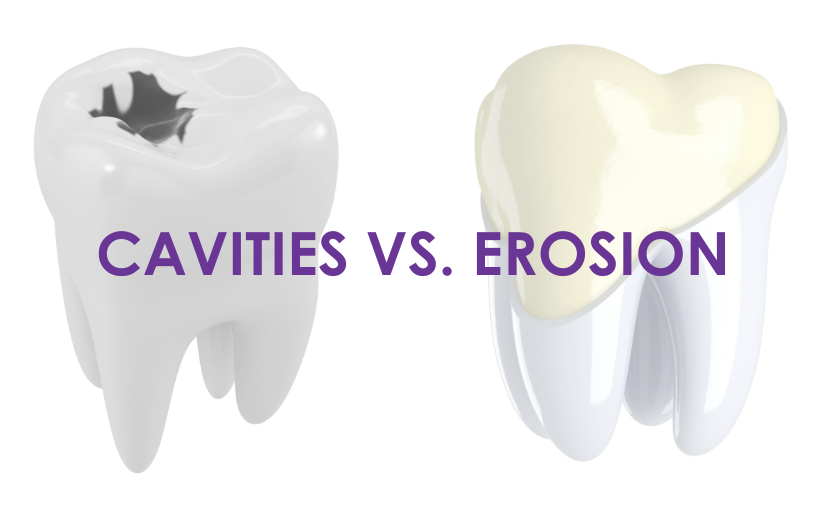By; Dr. Elizabeth Eggert
When we talk about cavities and tooth erosion, we’re talking about two very different dental processes. While both processes result in the breakdown of your teeth, they can be caused by different factors, and thus require different solutions.
In this post we’re going to share the differences between cavities and tooth erosion, their effects on your dental health, and offer some suggestions for prevention.
Cavities (Also Called Tooth Decay)
Cavities are permanently damaged areas in the hard surface of your teeth that develop into tiny openings or holes. This tooth decay can be caused by a combination of factors, including:
- Bacteria in your mouth
- Frequent snacking
- Sipping sugary drinks
- Acidic foods or drinks
- Not cleaning your teeth well
Dental Effects
Because cavities make the tooth weaker, they can cause a number of uncomfortable side effects, including:
- Toothache
- Tooth sensitivity
- Mild to sharp pain when eating or drinking something sweet, hot, or cold
- Visible holes or pits in your teeth
- Brown, black, or white staining on any surface of a tooth
- Pain when you bite down
Prevention
The best way to prevent cavities is to maintain a proper oral hygiene routine. You should be brushing your teeth at least twice a day and flossing at least once a day. Additionally, you need to maintain a regular cadence of visiting Eggert Family Dentistry for professional dental cleanings and recare visits. While your at-home regimen is critical to preventing cavities, getting your teeth professionally cleaned on the interval recommended by Dr. Jeff or Dr. Elizabeth is key to making sure no stone is left unturned when it comes to your oral health.
Tooth/Enamel Erosion
Tooth enamel is the hard, translucent coating that covers the crowns of your teeth, protecting them from bacteria. This coating helps prevent tooth decay, and thereby plays a critical role in overall dental health. But, when enamel is eroded, problems arise.
Enamel erosion is similar to tooth decay in that it weakens the tooth. But rather than being caused by bacteria, teeth surfaces can be worn down and weakened by:
- Acids in food and drink
- Stomach acids
- Misalignment
- Clenching and grinding
- Chewing ice
- Naturally weak enamel
When your enamel wears down, your chances of developing decay become much higher, as there’s less of a protective layer between bacteria and the softer interior of your teeth.
Dental Effects
If you experience any combination of the following symptoms of enamel erosion, make an appointment with Eggert Family Dentistry today:
- Tooth sensitivity
- Pain or discomfort when eating something sweet, hot or cold
- Change in the color of your teeth (with erosion, they often look gray or yellow)
- Change in shape of your teeth (they may become sharp, chipped, or sometimes smooth like a stone)
- Cracks in the teeth
Prevention
To prevent tooth erosion, reduce your intake of food and drinks containing acid. Or, if you’re going to have high acid food/beverages, try to eat them with other non-acidic foods to balance the acid content. Additionally, don’t brush immediately after you eat or drink food containing acid. Instead, rinse with tap water and wait about an hour until your enamel has a chance to remineralize again from your saliva before you brush.
Most importantly, to prevent tooth erosion, visit Eggert Family Dentistry for regular recare visits so we can keep an eye on your dental health! We can assess whether these damages are due to acidic foods, decay, or bruxism, which can be prevented with appropriate treatment. Consider using a remineralization medicament, and ask about the restoration of your teeth to prevent further damage.
If you’re experiencing tooth sensitivity, changes in tooth color, cracks, chips, or dents in your enamel, or if you’re due for your next recare, routine dental visit, please don’t hesitate to contact our office at 651.482.8412 and set up an appointment today!
